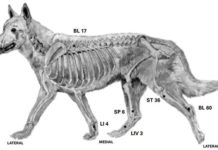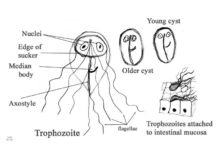Involuntary Urination
When my dog Popcorn woke up one morning many years ago in a puddle of urine, I panicked, certain that only a deadly illness could cause this perfectly housetrained dog to wet her bed. I rushed her to the vet, where he did a thorough physical exam and urinalysis. I can still remember the relief I felt when my vet told me it appeared to be a simple case of incontinence. As it turns out, incontinence, which is defined as involuntary urination, is quite common in dogs, especially spayed females, where about one in five dogs (20 percent) is affected.
Probiotics Boost Canine Overall Health
Who hasn't heard of friendly" or "beneficial" bacteria? Even acidophilus
Natural Remedies for Cleaning Dog Wounds
Your dog just had surgery, stepped on broken glass, caught her tail in a door, has a puncture wound, got bit or scratched, tangled with barbed wire, or has an abrasion that came from who knows where. You want the wound to heal quickly without bleeding, pain, or infection. The following strategies help achieve that result.
Post-Operation Acupressure for Dysplastic Dogs
After consulting with three veterinary surgeons, it was decided that the best course of action for my dysplastic dog was a triple pelvic osteotomy (TPO), where the hip is reformed to create a socket. This procedure was considered experimental 10 years ago when Oak was much in need of it. Today, it is a common surgery for hip dysplasia.
Understanding Behavior-Altering Drugs For Dogs
Ten years ago, my dog Piglet woke me in the middle of the night, trembling violently and utterly terrified. It took me hours to track the source of her panic to a barely audible high-pitched beep that sounded once every two minutes, coming from a smoke alarm’s low battery indicator. Behavior-altering drugs can help dogs with phobias or anxiety disorders but you have to learn which ones work best in each case.
Canine Adrenal Glands
The adrenals are small glands located just forward of the kidneys. They are so small, in fact, they were virtually ignored by early anatomists for centuries. Although small in size, they are extremely important in the overall hormonal balance of the body and its ability to maintain homeostasis.
A Healthy Pancreas for Canine Diabetes Prevention
The pancreas is an elongated gland, light tan or pinkish in color, nestled alongside the small intestine and adjacent to the stomach. The organ is composed of two functionally separate types of glandular tissue, each which performs a vital and disparate role in the dog's body.
Activity-Related Canine Injuries
He’s fearless. Reckless. Senseless? Or perhaps my Australian Cattle Dog, Cedar, is just accident-prone. Yesterday he slammed head first into a door jam during rough play with my Shepherd-mix, Willow. Today he did a nose dive off a five-foot embankment in pursuit of his favorite all-natural dog toy: a pine cone. As always, he retrieved the cone, chewed it into a slobbery clump of fibrous goo, and dropped it at my feet. On his trot back I noticed he was limping, holding his front leg off the ground.
Dog Gone Pain: A Safe Arthritis Pain Relief Product For Dogs
As the sole practitioner of a small animal practice encompassing massage, acupressure, homeopathy, and custom-blended flower essences, I'm always looking for products that may be effective for my clients' animals. The most obvious, positive, long-lasting results I have seen have come from the use of acupressure, massage, and homeopathy. Yet when I heard from a third client about a product called DGP" (short for "Dog Gone Pain")
Treating Problematic Giardia Infections in Dogs
which resemble cartoonish eyeballs
Treatment for Canine Heartworm Infections
Treatment for a heartworm infection is critical, but it's not without risk. By being prepared for what can happen, you should be able to bring your dog through safely. Whether or not you choose to use conventional heartworm preventatives, there is always the possibility that you may one day find yourself with a heartworm-positive dog, and be faced with the decision of how to treat her.
Is Cancer Prevention for Dogs Possible?
What could be better than curing your dog's cancer? That's easy! How about avoiding the illness in the first place? No one has done any clinical trials or statistical studies that prove you can prevent cancer in at-risk dogs. But common sense and clinical experience make a strong case for avoiding anything that exposes an animal to known carcinogens or weakens the immune system


















